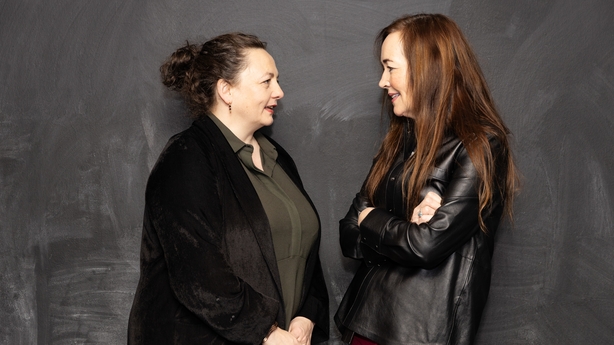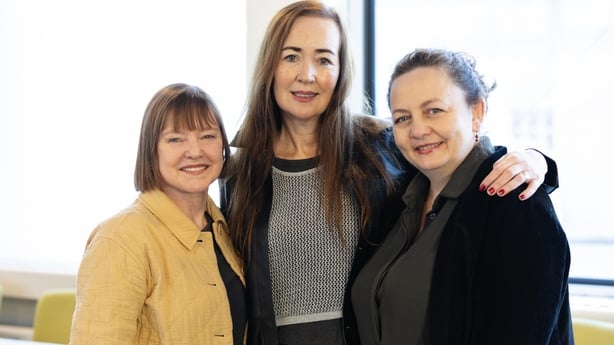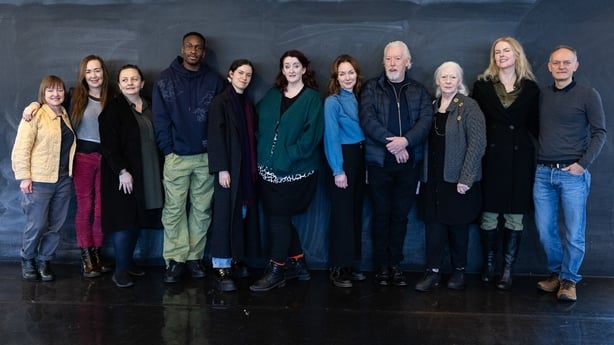"It is a theatre, after all, magic is meant to happen."
Playwright Marina Carr & Director Caitriona McLaughlin talk to Abbey Theatre Literary & New Work Director Ruth McGowan about their latest collaboration, the world premiere of Carr's new play, Audrey or Sorrow, a co-production with Landmark Productions which debuts on the Abbey stage this month.
Ruth McGowan: Marina, how did this play first come to you? Did it begin with a character, an image, a particular thematic thread? What came knocking first?
Marina Carr: The impulse to write came knocking. And that was the thing. I don't think I've ever started a play not having a clue about anything before. I hadn't written in a while, and I really wanted to write. I was on holidays in Spain, it was ideal. Swim in the morning, back to the house, sit in the shade and write. I said, 'I'm just going to follow the instinct'. I had no idea what it was going to be, or how it was going to end. I want to write more like that. Just chasing the characters by the tail, which is exhilarating, to see what they're going to say to you. Let them be as mad as they want or as childish as they want or as ancient as they want to be. And just let things happen. It is a theatre, after all, magic is meant to happen, so let things happen.
R McG: Caitríona, tell me about your first encounter with this play. What was your impression when you read it?
Caitríona McLaughlin: Anne Clarke (from Landmark Productions) is a great collaborator. When she shared the conversation she was having with Marina about this extraordinary play, I was intrigued. And then when I read it, I knew we had to do it, Landmark and the Abbey together. You don't often get something that you can't stop reading until it's finished. Like the experience Marina described writing it, you haven't a clue what you're reading at first. The subject matter is challenging, but challenging in the way that really important things make you think. When you find yourself on a kind of roller coaster of emotions rather than on an intellectual journey, you know you've got something special.
R McG: Your last collaboration on the Abbey stage was iGirl, which had a multiplicity of voices and characters in it, from Joan of Arc to Jocasta, but they were all filtered through one body on stage. This play is an ensemble piece, so that prism of perspectives is made manifest on stage, eight characters demanding to be seen and heard. Does that offer you both something different in the creation process?
MC: I suppose the element of play and just the variousness of them all. I've spent my life writing characters, and trying to make characters add up, and trying to get your dramatic arc in place etc., all the toolkits of playwriting. I didn't deliberately set out to smash that, but I think that's probably what I was doing in different ways in the last couple of years of writing with Hecuba, iGirl, Girl on an Altar. Experimenting with the form of the drama.
We need your consent to load this rte-player contentWe use rte-player to manage extra content that can set cookies on your device and collect data about your activity. Please review their details and accept them to load the content.Manage Preferences
Listen: Marina Carr talks to Miriam O'Callaghan
C McL: All eight of these actors are incredibly inventive, and they are all open. Every single one of them goes for every single thing we ask of them. There's no self-consciousness in it, there's no judgment and there's no cynicism, there is just this incredible generosity to each other. Each of these characters, these entities, be they human or not, they all have their own very distinct rhythm in the writing. And we've been talking a lot about different dimensions working through the play, asking ‘what dimension are we in now?’’.
R McG: Speaking of other dimensions, Marina, the ghost world, or the spectre of the past haunting the present reoccurs across your body of work. This piece explores the gap between what you know to be true in evidence, and what you feel to be true innately. Is that sense of the mysterious something that you're interested in pursuing?
MC: Are you talking about eternal truths versus our very quotidian kind of mortal truths and laws? Yeah, I do think that is a huge thing. Particularly, how secular the world has become and where that aspect of faith and belief in something beyond reason is now. To me, ghosts has become a word much traduced. It doesn't explain the power and the mystery of visitations or emanations or whatever these presences are, that we all feel beside us at times. Worlds we know in theory exist. Mathematically they can prove eleven dimensions, I think, but they have no idea what they look like visually. We just don't have the mind capacity for that yet. But just because we can't understand it in our little world, doesn't mean they don't exist.

R McG: Absolutely. Caitríona, you're here with a dual role: as Artistic Director, you're the person who is programming the Abbey stage as well as directing this play. I thought about the invitation you issue here to a 2024 audience, in an information saturated age, to come into the theatre and reflect on a world that exists beyond the factual. What are you hoping that audiences will get from that provocation?
C McL: As a culture, we are very embedded in language, and we honor the language that our literary figures use. What's really exciting about this play is that we come to terms with the limitations of language. This play offers the possibility to open our minds to ideas around existence, and legacy and potential in a way that's not confined to the phrases that we use around religion or spirituality or life or death. The three-dimensional quality that a strong feeling has, like when you wake up with your heart beating faster because of a dream that you've had. The physical reality of experiences and feelings, and the fact that we can never fully articulate them. What connects us more than anything is how we feel about all those things that we don't have the words to talk about.
MC: I’d add that we're in the theatre of Augusta Gregory and WB Yeats, with their absolute investment in all things that could not be explained except by imagination or faith and belief. The folklore collections, the poetry, both of their plays - it's all there. We're in the right territory.
Watch: Audrey or Sorrow - meet the cast
R McG: The play deals with some heavy themes like grief, but it is immensely playful. There's a lot of laughter coming out of that rehearsal room – we can hear it every day echoing round the corridors. Caitríona, can you tell us about trying to hold the light and the dark for the actors, and then also for the audience?
C McL: Very often in the worst experiences you have in your life, you find that you're laughing. And we all know about laughing so much that we cry. Anyone who belongs to any kind of family will understand the inexplicable grief that happens when you lose someone, whatever age they are. But there's so much hope in the idea that they never stray too far away. That the combination of molecules that disappear in our world, are reforming and trying to become another version of themselves somewhere else. It's such a lovely thought. The other side of it is, one of the things I appreciate most about Marina's work is that she doesn't pull back from anything. There’s no subject that she won't explore. Anything that has to do with being a human being, she will dig into, rip apart, give a perspective on. I mean, that kind of bravery is the only way we're going figure out all the challenges going on in the world at the minute, of which there are plenty.
I don't know any writer that forces us to look at ourselves the way Marina does.
R McG: Marina, you have taken so much inspiration from Greek mythology in your recent plays. But the great excitement for me with Audrey or Sorrow is that it is 100% proof, pure, original Marina Carr. It's contemporary Ireland, and it’s an entirely new world. Was that fun?
MC: Great fun. Yeah, it was liberating. You have to do your apprenticeship as with anything, it's a craft. You have to put in those decades. Then you get to a point where you say, 'to hell with it all'. I've been a good girl for too long now and I'm just going to have a bit of fun and write what I want to write. I'm hoping the audience will come to it with that kind of open heartedness and divil-may-care kind of thing. Going with it. Figuring it out. As I figured it out, as the actors figured it out, as Caitríona figured it out. And just the absolute joy of creation as well. I haven’t known that for a while now.

Carr (middle) and director Catriona McLoughlin (R)
R McG: There were surprises for you in writing that way because you didn't start out knowing where you were going to end. When you dip into rehearsal now, is the play still surprising you?
MC: Really surprising. I have no idea what's going to happen from one day to the next. I was watching rehearsal through the window just now and saw Marie up on the table in a christening blanket thinking 'This is new! That’s not in the script!’ But I love that. Creative people bring their own script to the table. So, it's not just mine. The words are mine but it's all to play for. I kind of relish that.
R McG: There was a strong reaction to the first glimpse of the visual world of the production, that striking communion dress image on the poster. Caitríona, can you describe the design concept, and how that came to be?
I've been a good girl for too long now and I'm just going to have a bit of fun and write what I want to write.
C McL: A lot of the ideas for the imagery are written into the script. Jamie Vartan designed the set, and the stairs were fundamental from the beginning. Very quickly, we all felt they had to dominate the space. The multiple dimensions are important. The playing space has a neutrality, which means that these characters fill the space and make the worlds, and then the world disappears again in their absence. Katie Davenport has made the most incredible costumes, they're gloriously fun and colorful. That world is based off playthings for children, so we started with the idea of those primary colors that kids play with, yellow, red, green, blue. The play has been written in a way that strikes you that it needs to be beautiful. Marina has written costumes, like veils, with classic, beautiful outlines from places like Chanel.
MC: They all read Vogue a lot, don’t they?
C McL: They do, they all love Vogue.
MC: And they went to Cambridge in their own head. Whatever that's about!
R McG: Yeah, the aspirational living of these spirits.
C McL: Totally. So, the design world is beautiful.
MC: Great, we need a bit of beauty, don't we?
R McG: You’ve worked on On Raftery’s Hill, iGirl and Audrey or Sorrow together to date, and you have The Boy on the horizon next. It’s an ongoing collaboration. I’m going to embarrass you now by asking you to talk about each other, in front of each other.
MC: That’s easy! I love working with Caitríona. She's fantastic on script, and a fantastic conversationalist and not at all prescriptive. There's carte blanche. Just as I would never be prescriptive about her direction. It’s that kind of mutual respect.

C McL: I feel that too. I can’t believe my luck. I don't know any writer that forces us to look at ourselves the way Marina does. She has the ability to take an audience into the darkest parts of the human soul and back out again safely, without making anybody feel compromised ever. I thought she has an enormous career behind her of these incredible plays. But the thing is, she is just getting started. Now she's going off to somewhere else entirely. Her work makes me nervous because her expectation on the art is uncompromising. Her expectation of herself is uncompromising. And anything less than everything you've got isn't enough. And that's how every actor who reads her scripts feels.
MC: It's around the quality of the conversation always, isn't it? I feel I could talk to Caitríona forever. And she'll understand what I'm trying to get at and if I can't articulate it, she'll finish the articulation for me and take me to the next level, which is always what you want. You just get the sense that you're in the presence of a brilliant mind. In that it's absolutely steeped in theatre history and theatre craft, massive experience working with actors and all the creatives you would have. She’s a benign spirit to be around.
C McL: There are very few people in the world that you could just say anything to without a feeling of judgment. And how can you get past conventional thought if you can’t say the unconventional thing?
MC: And know you’re safe.
R McG: Sounds like it's a meeting of minds and spirits. Very fitting for this play.
Audrey or Sorrow is at the Abbey Theatre, Dublin until 30 March - find out more here.

